
CANNON BALL, N.D. (AP) — The prospect of a police raid on an encampment protesting the Dakota Access pipeline faded as night fell Wednesday, with law enforcement making no immediate move after protesters rejected their request to withdraw from private land.
Unmarked aircraft that had been monitoring protesters were withdrawn late in the day, and some activists who had been on hand for a possible confrontation headed back to a larger protest camp on federal land.
Law enforcement officials said they were ready to remove about 200 protesters who this weekend set up teepees and tents on land owned by the pipeline company.
Cass County Sheriff Paul Laney told reporters that authorities don't want a confrontation but that the protesters "are not willing to bend."
"We have the resources. We could go down there at any time," he said. "We're trying not to."
Morton County Sheriff Kyle Kirchmeier said authorities would continue to try for a peaceful resolution but that "we are here to enforce the law as needed."
Protesters vowed to stay put, at one point chanting "Stand in peace against the beast."
"We're going to hold this ground," said protester Mekasi Camp Horinek.
"I'm here to die if I have to. I don't want to die but I will," said Didi Banerji, who lives in Toronto but is originally from the Spirit Lake Sioux reservation in North Dakota.
Activists fear the nearly 1,200-mile pipeline could harm cultural sites and drinking water for the Standing Rock Sioux tribe.
Energy Transfer Partners, which is building the $3.8 billion pipeline, said Tuesday that the protesters were trespassing and that "lawless behavior will not be tolerated."
Protests supporting the Standing Rock Sioux tribe's opposition to the pipeline have been ongoing for months, with more than 260 people arrested so far in North Dakota. The pipeline is to carry oil from western North Dakota through South Dakota and Iowa to an existing pipeline in Patoka, Illinois, where shippers can send it on to Midwest and Gulf Coast markets. Energy Transfer Partners has said the pipeline is nearly complete other than the work in south central North Dakota.
Local sheriff's officials had said earlier they didn't have the resources to immediately remove activists from the private land, which is just north of the main protest camp on federal land near Cannon Ball, a town about 50 miles south of Bismarck. But officers called for reinforcements, and those were arriving from other states.
One notable clash came on Sept. 3, after construction crews removed topsoil from private land that protesters believe contained Native American burial and cultural sites. Authorities said four security guards and two guard dogs were injured. The tribe said protesters reported that six people were bitten by security dogs and at least 30 people were pepper-sprayed.
The state and pipeline company dispute that any sacred grounds have been disturbed during the construction.
North Dakota's Emergency Commission approved $6 million in emergency funding for law enforcement costs related to the protest — but as of Wednesday, nearly all of that had been used up. The Department of Emergency Services plans to ask for more, Fong said.
The protest has drawn the attention of activists and celebrities, including actress-activist Shailene Woodley and Green Party presidential candidate Jill Stein. Civil rights activist Jesse Jackson and actor Mark Ruffalo were at the protest camp Wednesday. Jackson said he was there "to pray together, protest together and if necessary go to jail together."






















